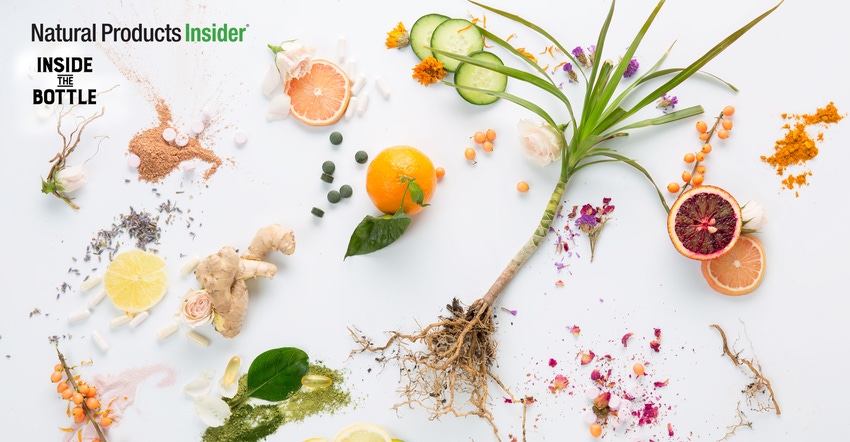
Companies from across the supplement supply chain advocate for a transparent industry and empower consumers to take control of their health. We tell the supplement industry’s story through content, research and education-based events.
Sustainability and stewardship in supplements: raising the bar in a responsible industry
The concept of sustainability in supplements is gaining momentum, especially among consumers who are younger, more ethnically diverse and who already regularly purchase natural and organic foods. Here's the latest from Inside the Bottle.
November 24, 2020

Sustainability involves the maintenance of a certain level of materials, or the avoidance of the depletion of natural resources in order to maintain an ecological balance. It is a term we are hearing about daily regarding the sustainability of our food, agricultural systems and the protection of our planet’s resources. But as with transparency, how consumers apply these terms to the products they purchase is widely variable.
In looking specifically at the supplements segment, the data would suggest that sustainability is not an important consideration for most supplement consumers, according to a recent survey of supplement users from Trust Transparency Center. But the concept of sustainability seems to be gaining momentum, especially among consumers who are younger, more ethnically diverse and who already regularly purchase natural and organic foods.
These issues will continue to have importance for consumers as they gain awareness of how goods are sourced, manufactured and distributed. Saumil Maheshvari, CMO of Orgenetics said he believes that sustainability is a matter of corporate responsibility and passion. The concept, he said, runs throughout Orgenetics and its culture. “We are stewards of sustainability,” he said. “We are a family business. We work together in the office and at home, so we have always had responsibilities to the business and the ingredients.” As an individual in a family business, he added, “it is tough to distance yourself from the company, so we are very passionate about what we do. It means a lot to us. Everything we do and say has significant backing and vetting internally. So, we are stewards of all we do.”
While organic ingredients are just starting to gain momentum in supplements, it is another measure of sustainability, according to Maheshvari. “By its very nature, organic farming is fundamentally sustainable,” he said. Instead of using harmful chemicals, organic farmers use methods like composting, crop rotation and inter-planting to control weeds and pests, replenish the soil and sustain the health of the planet. This is an important process, he noted, as a wave of new and non-organic farming gains traction. While these practices may provide a leap in productivity or better early yields, they do cause mid- and long-term issues.
Orgenetics’ focus has always been on organic farming practices, he said, which, time and time again, have been shown to support well-balanced soil, prevent soil erosion, save energy by not using pesticides and fertilizers and protect the health of farm workers. Soft Gel Technologies, Inc. (SGTI) is also committed to sustainability and building a greener future, Steve Holtby, the company’s CEO, explained. “We’re reducing our environmental footprint by producing our own energy (through a cogeneration machine that generates electricity using clean-burning natural gas) and striving toward lean manufacturing, recycling paper, using energy efficient lighting and utilizing earth-friendly cleaning products.”
As a soft gelatin capsule manufacturer, SGTI has also reduced the amount of gelatin left over from each manufacturing run, and sells the remnants to other industries, generating less waste. Establishing sustainability, however, doesn’t have to be an all-or nothing proposition. It can be gradual, Holtby said, adding, “Supply chains can be improved through major changes, but it’s more common to see results through small, repeated improvements. Every change that slightly reduces waste, speeds up delivery or enhances quality can make a tiny, incremental improvement to sustainability.”
Maheshvari agreed that sustainability takes small steps and must be ongoing. Orgenetics is always looking to implement new technologies as they become practical. “When we started, solar panels were very expensive. The yield was low, and they were not sustainable. But as the years progressed, they have become more efficient and less expensive to provide electrical needs for farming, he said. “So, we are always looking at things like that, and as technology improves, we make decisions to add more sustainable practices.”
A complex conversation
These ideas are generating discussions among industry stakeholders. “Sustainability is becoming more important in the dietary supplement conversation,” noted Trust Transparency Center’s Managing Director Len Monheit. It has been at the core of the natural products industry for some time, he said, but “in supplements and ingredients it is a much more difficult conversation, as the Non-GMO Project found out. Sustainability in supplements can be counterintuitive and a tougher, more complex conversation.”
By example, the supplements industry is currently debating the practice of using synthetically derived ingredients in its products and how to appropriately disclose that use. It is particularly common in products like vitamin C, in which natural sources are not adequate to supply the demand. Synthetic ingredients have long been used in many dietary supplement products, and the process to create these ingredients is generally thought to be effective and accurate in copying active compounds. In some cases, it could be argued that these ingredients are more sustainable.
At the other end of the spectrum, synthetic biology is not a process that is allowed under the standard for the Non-GMO Project because the group feels this is something consumers want to avoid. It is important to note that the use of synthetic ingredients, even those that may be molecularly identical to their naturally derived counterpart, could be labeled as synthesized but there is not a legal requirement to do so. This can leave consumers wondering. In fact, according to 2019 NEXT Data & Insights research conducted for Inside the Bottle, the use of synthetic ingredients in supplements was the number two lightning rod issue because of associated fears and concerns about the concept of synthetic. This could be solved with greater transparency and more consumer education, creating more trust and giving consumers the choice.
Meanwhile, synthetic botanicals are caught in a regulatory impasse in which the FDA ruled in an August 2016 guidance that synthetic botanicals are not approved as dietary ingredients (with a few grandfathered exceptions). It is an area that may need some attention from the supplements sector with regard to sustainability and transparency. Consumers are relatively comfortable with synthetic ingredients in supplements, noted Michael McGuffin, executive director of the American Herbal Products Association (AHPA).
But we need to understand these attitudes with this focus on transparency, he added. “We should not be surprised if at some point, consumers want to know where these ingredients come from and make buying decisions based on that.” This leaves the supplements sector at a breakthrough moment and a time to initiate tough discussions and get out ahead of the curve. And this may be where the broader idea of stewardship comes in. The term “stewardship” is now being used by some industry stakeholders as a descriptor for how a responsible industry behaves and supports sustainability initiatives.
Stewardship and sustainability are not the same thing, explained Sabinsa’s Majeed, “but you could say that stewardship is required for sustainability. We consider ourselves stewards of India’s indigenous botanicals that have been known to have health benefits for thousands of years. Our stewardship takes multiple forms, from using modern research methods to confirm and expand upon the ancient Ayurvedic knowledge to initiating a large reforestation program to protect the Indian kino tree (Pterocarpus marsupium). We also have an extensive contract farming program that provides us with the high-quality raw material we need, but has also developed into rewarding, mutual- support through infrastructure improvements and educational contributions.”
For OmniActive Health Technologies, too, sustainability must be comprehensive. The company is working to improve lives throughout its supply chain with its Improving Lives Foundation (ILF). This important movement is part of the company’s corporate social responsibility (CSR) initiative, which is focused on improving the health and livelihood of small farming communities.
“We believe that every step in our supply chains provides an opportunity for positive change and improvement – whether it is a process, an ingredient or the health and wellness of a person or community,” noted Rushva Parihar, head of OmniActive’s Improving Lives Foundation.
To read more about how our Inside the Bottle supply chain partners are committing to transparency, quality and sustainability, download the full Supply Chain Commitments guide here.
You May Also Like